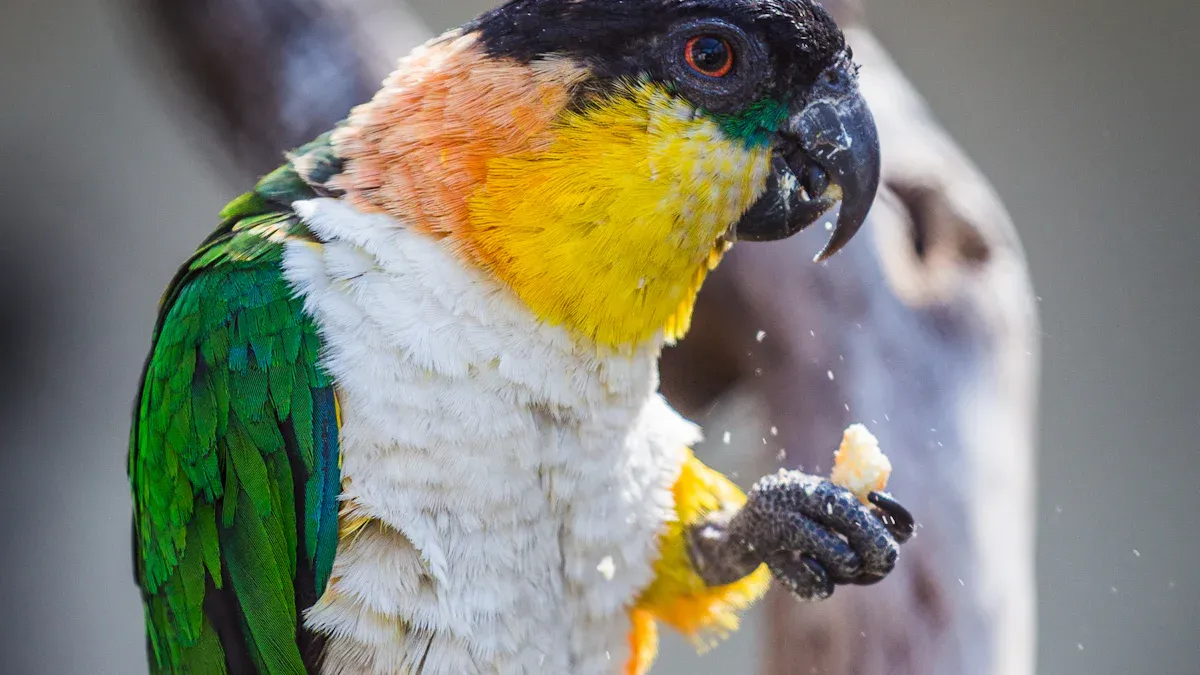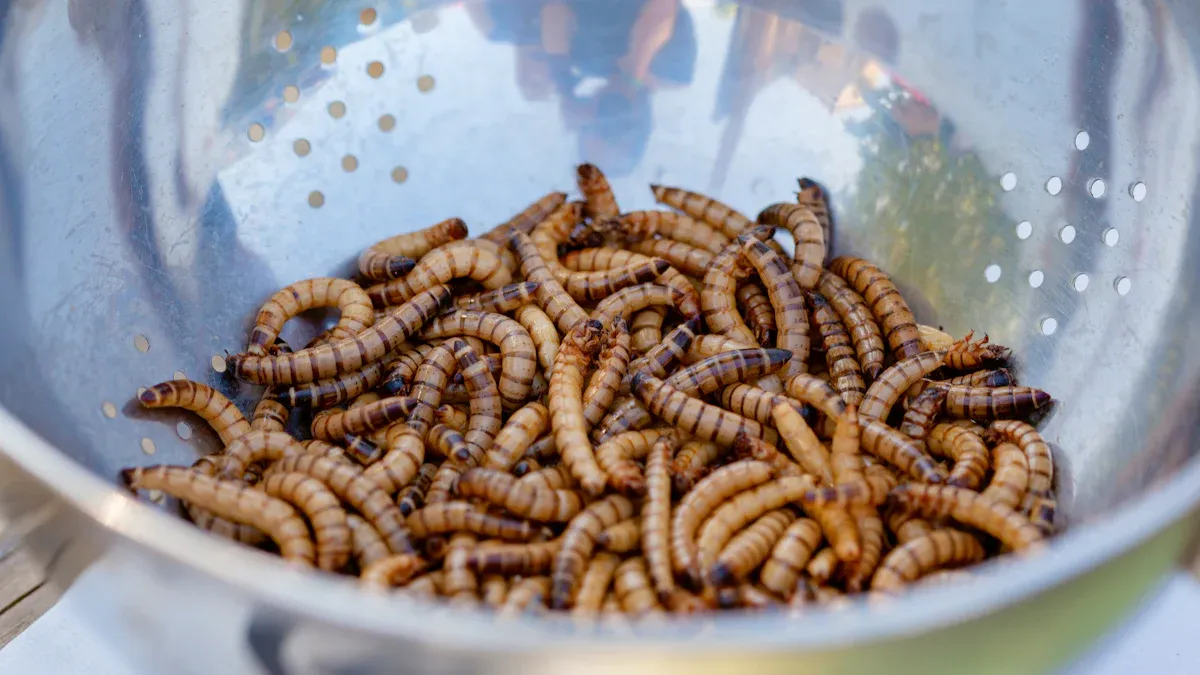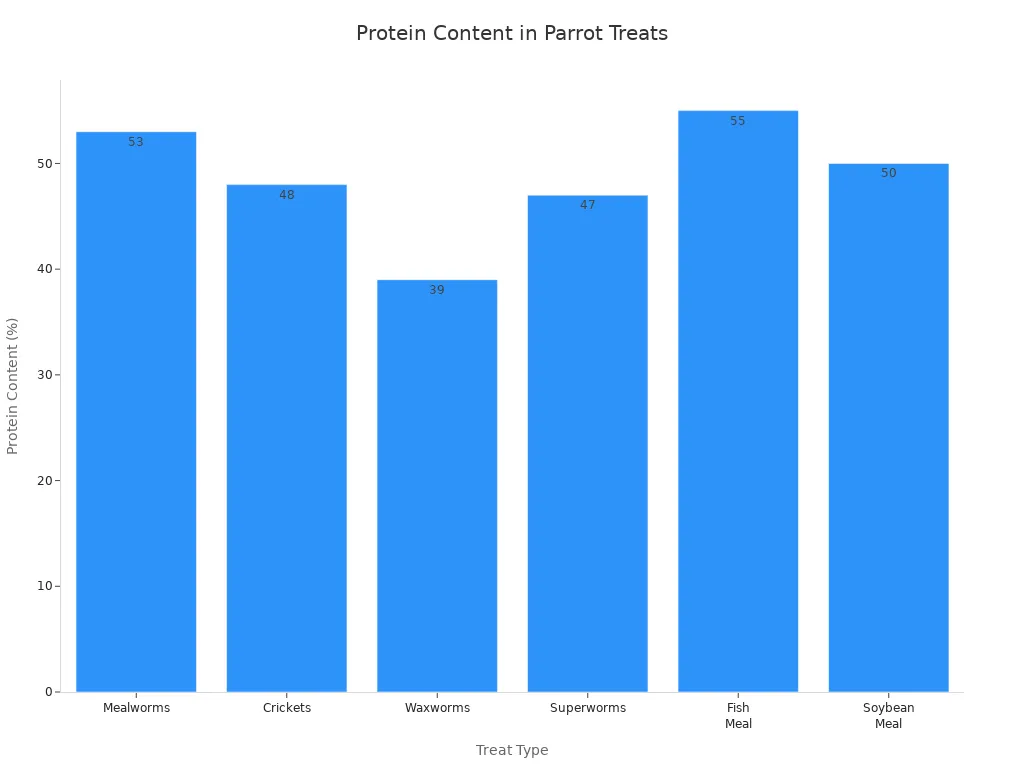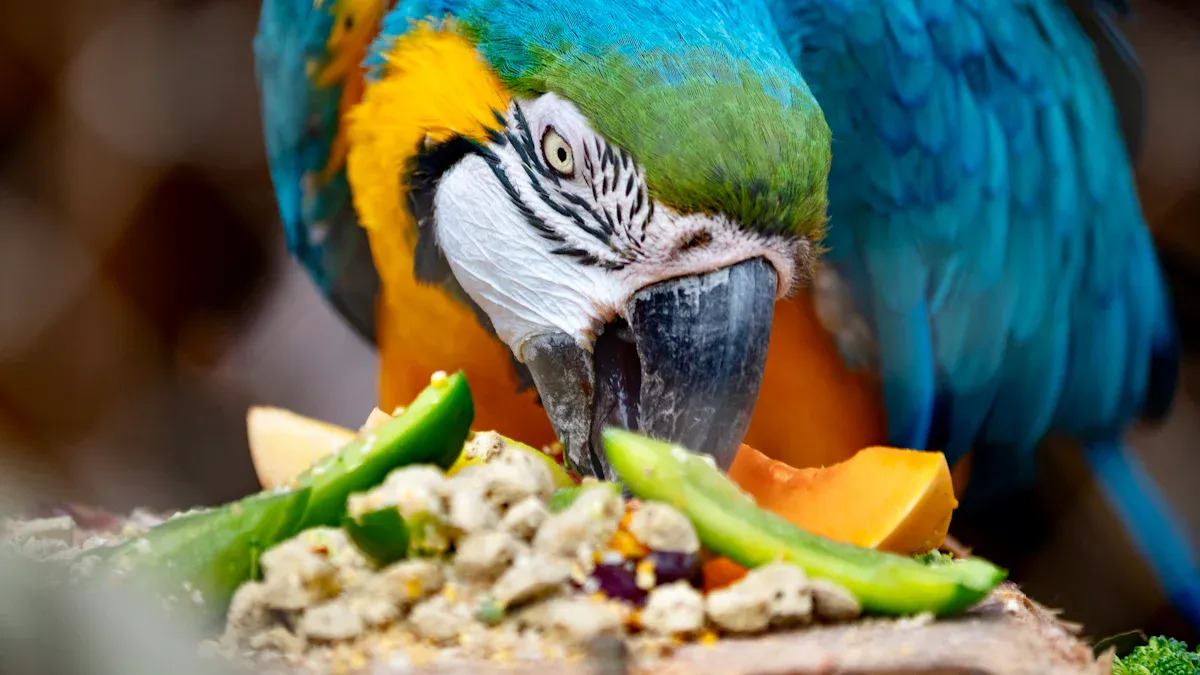
Mealworms for Parrots make a tasty and nutritious treat. They offer high protein and fat, which help support muscle, feather growth, and energy. Many parrots love them and show natural interest. Experts recommend safe handling and moderation, as mealworms encourage healthy foraging and boost overall parrot health.
Key Takeaways
- Mealworms provide parrots with high protein, essential amino acids, healthy fats, vitamins, and minerals that support muscle growth, feather health, energy, and immunity.
- Use mealworms as a special treat in moderation, about 1-2 times per week, to encourage natural foraging and keep parrots active and happy without adding too much fat.
- Choose mealworms from safe, reputable sources and offer a varied diet including fruits, vegetables, seeds, and nuts to ensure balanced nutrition and strong bones.
Mealworms for Parrots: Nutritional Value and Health Benefits

Protein, Fats, and Essential Amino Acids
Mealworms for Parrots stand out as a protein powerhouse. Dried mealworms contain about 53% protein by weight. This level is higher than crickets, waxworms, and superworms. The table below shows how mealworms compare to other common parrot treats:
| Treat | Protein Content (%) |
|---|---|
| Mealworms | ~53 |
| Crickets | ~48 |
| Waxworms | ~39 |
| Superworms | ~47 |
| Fish Meal | ~55 |
| Soybean Meal | ~50 |

Mealworms for Parrots also provide all the essential amino acids. These include lysine, methionine, tryptophan, and threonine. Parrots need these amino acids for muscle growth, tissue repair, and healthy feathers. The fat content in mealworms ranges from 25% to 45%. This fat gives parrots energy for daily activities and supports brain function. Many parrot owners notice their birds become more active and alert after enjoying mealworms as a treat.
Vitamins, Minerals, and Dietary Fiber
Mealworms for Parrots offer more than just protein and fat. They contain important vitamins and minerals that help parrots stay healthy. Here is a quick look at what mealworms provide:
- Good amounts of B-vitamins (though less thiamin and B12 than some other insects)
- Some vitamin C
- Small amounts of vitamins A, D, and K
- Essential minerals like magnesium, zinc, iron, copper, and manganese
- Major minerals such as sodium, phosphorus, and potassium
| Nutrient | Quantity / Description |
|---|---|
| Calcium | Low, around 20 mg/kg |
| Phosphorus | Relatively high, Ca:P ratio approx. 1:14 |
| Magnesium | Present (quantity not specified) |
| Zinc | Present (quantity not specified) |
| Iron | Present (quantity not specified) |
| Copper | Present (quantity not specified) |
| Manganese | Present (quantity not specified) |
| Sodium | Present (quantity not specified) |
| Potassium | Present (quantity not specified) |
| Selenium | Present (quantity not specified) |
| B-vitamins | Good amounts, but less thiamin and B12 than other insects |
| Vitamin C | Some content |
| Vitamins A, D, K | Low amounts |
Mealworms also contain up to 6% crude fiber. This fiber helps parrots digest their food and keeps their digestive system healthy. When parrots eat mealworms in moderation, they get the benefits of fiber along with protein, fats, and minerals.
Tip: Because calcium is low in mealworms, parrot owners should offer other calcium-rich foods or supplements to keep their birds’ bones strong.
How Mealworms Support Parrot Health
Mealworms for Parrots can make a big difference in a bird’s health when used as a treat. The high-quality protein helps parrots build strong muscles and repair tissues. Essential amino acids support feather growth and keep plumage shiny. The fats in mealworms give parrots the energy they need to play, fly, and explore.
The vitamins and minerals in mealworms boost the immune system. Parrots that get enough zinc, iron, and B-vitamins often have better resistance to illness. The fiber in mealworms helps with digestion, so parrots can absorb more nutrients from their food.
Many parrot owners use mealworms as a reward during training or to encourage natural foraging behavior. Birds enjoy the taste and texture, which makes mealtime more exciting. When included as part of a balanced diet, mealworms help parrots thrive and stay active.
Mealworms for Parrots: Safe Feeding Practices and Dietary Role

Treat vs. Staple: Moderation and Variety
Mealworms for Parrots work best as a treat, not a daily staple. Parrots need a mix of fruits, vegetables, seeds, and nuts to stay healthy. When owners offer mealworms in moderation, birds enjoy the taste and get extra protein. Too many mealworms can lead to too much fat in the diet. Parrots also benefit from variety. Mixing mealworms with other foods keeps meals interesting and supports balanced nutrition.
Parrots often show more excitement and natural foraging when mealworms appear as a special treat. This behavior helps reduce boredom and feather picking, leading to better overall welfare.
Live vs. Dried Mealworms: Pros, Cons, and Safety
- Live mealworms can be gut loaded with nutritious foods, boosting their value for parrots.
- Dried mealworms have more protein by weight but may lack some nutrients found in live ones.
- Some birds prefer live mealworms for taste and texture.
- Dried mealworms are easy to store and handle.
- The drying process can lower the risk of pathogens.
- Both types are safe when sourced from reputable suppliers who use sustainable and ethical practices.
| Contaminant/Pathogen Type | Examples | Occurrence in Commercial Mealworms |
|---|---|---|
| Foodborne pathogens | Staphylococcus aureus, Bacillus cereus | Frequently detected |
| Parasites | Tapeworms (Hymenolepis spp.) | Reported, not harmful to humans |
| Viruses | IIV-29, Acheta densovirus | Species-specific, not harmful |
Portion Sizes, Frequency, and Preparation Tips
Owners should offer mealworms as a small part of the diet, about 1-2 times per week. A few mealworms per serving is enough for most parrots. Always avoid wild-caught insects, which may carry pesticides or harmful bacteria. Choose mealworms from trusted sources that follow animal welfare and food safety standards. For live mealworms, gut loading with fresh veggies before feeding adds extra nutrition. Dried mealworms can be soaked in water to make them easier to eat.
Mealworms for Parrots offer high-quality protein, vitamins, and minerals. They support growth, energy, and happiness. Parrots thrive when owners use mealworms as a treat, not a main food. Always choose safe sources and keep their diet varied for the best health.
- Mealworms for Parrots provide essential nutrients.
- They help boost vitality and well-being.
- Moderation and variety keep parrots healthy.
FAQ
Can all parrot species eat mealworms?
Most parrot species can enjoy mealworms as a treat. Owners should check with an avian vet before adding new foods to a bird’s diet.
How should owners store dried mealworms?
Store dried mealworms in a cool, dry place. Use an airtight container to keep them fresh and safe from pests.
Do mealworms replace other protein sources for parrots?
Mealworms add variety but do not replace other protein sources. Parrots need a mix of seeds, nuts, fruits, and vegetables for balanced nutrition.


